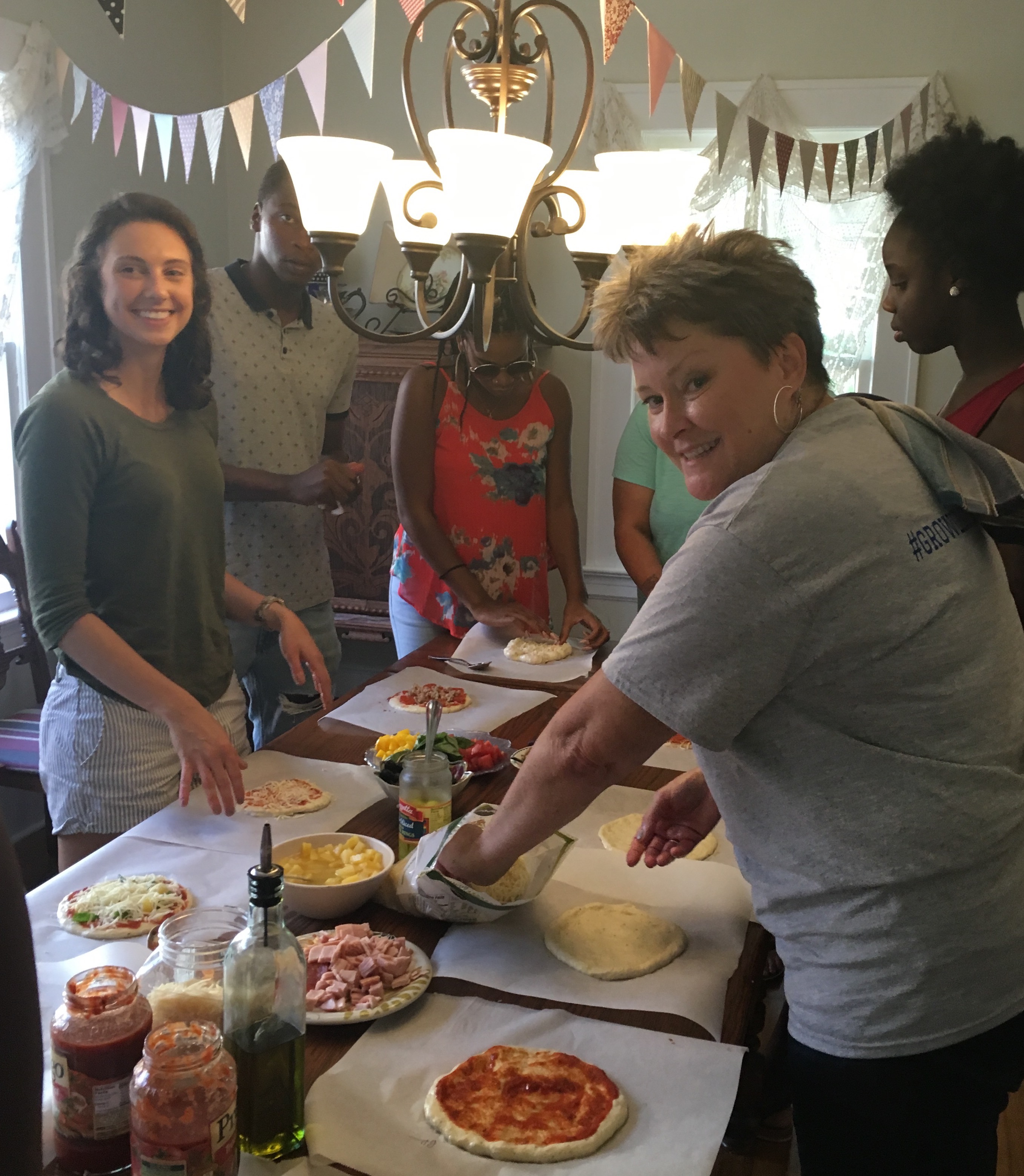
The girls love pizza night at Bible study. Gifted with a perfectly round ball of freshly made pizza dough set atop a crisp piece of parchment paper, each girl transforms into a master chef for the evening. Each step of the process allows them to make choices about the outcome of their raw materials that stretch their creative and culinary limits. Some girls choose to pound out their dough as thinly as possible, anticipating a thin, crispy crust, while others roll some cheese right into the dough with hopes of a gooey, decadent cheesy crust. They get to then choose how much sauce to smatter on their canvas, and how much cheese to sprinkle on top. The star of the show, of course, is the array of toppings: freshly cut tomatoes and bell peppers, backyard-grown basil, juicy black olives, crumbled sausage, classic pineapple and ham, and the crowd favorite, pepperoni. To many of the girls, the options laid out before them seemed overwhelming, and they chose not to stray too far from the safety of cheese and pepperoni, while others threw on everything but the kitchen sink (or in this case, the black olives–apparently not a topping of choice when you’re 12 and 13 years old). Then we retreated to the living room to hunker down for the long 10-minute wait.
I think we all act a little bit like this when faced with choices: either remain in the safety of what you know and love, or hastily pick whatever seems appealing at the moment, which appears to be working until you end up with a bite of banana pepper and pineapple in your mouth and you instantly regret every impulsive decision that led to this moment. When we make decisions, those as inconsequential as pizza toppings as well as the big ones that can change the whole course of our lives, we face a whole host of competing interests and influences. One of the factors that contributes to the way one individual person processes choices is the environment in which he or she grew up.
By pointing out the importance of context in personal development and decision-making, I realize I run the risk of proposing some sort of deterministic view of the world in which people are strictly bound by their environments. I tend to reject this line of thinking, as it boxes people into pre-determined life trajectories that fail to account for the possibility of personal agency, and most importantly, divine power, to break through barriers, perceived or real. I also don’t think it’s very helpful to completely ignore specific contextual limitations in favor of looking only at individual agency. What I see when I look at these young men and women, not just when they are choosing pizza toppings, but when they are grappling with decisions relating to school, work, family, and personal goals, is a mixture of finitude, fear, and freedom to which I can relate in some ways, and in some ways have no context for understanding.
Take, for instance, one of the recently graduated seniors in our ministry who has dreams of going to college but also has responsibility of her nephew and needs to find a job to help support her and her family. As she works through figuring out what her future holds, she faces both her natural finitude as a human, and the specific limits that her situation places on her. She faces the fear of what any wrong step could mean for her and her family and the fear that she might not be able to achieve her dreams.
If this were the end of the story, many people reading this wouldn’t be surprised, as it fits into the common narrative of “under-privileged” youth who are blocked from success because of their circumstances. Bigger Thomas, the protagonist in Native Son, fulfills this role in a more dramatic manner, showcasing the fatal effects of the toxic environment created in the racially and socioeconomically segregated ghettos of this country. Grow up in the inner city and you’re doomed to stay there, with the only means of escape being prison or death. Or so the narrative goes.
What I’ve seen as one of the foundational pieces of Rebirth’s heart is the desire to flip the script on that story. For the young woman I mentioned, the work of God through Rebirth has introduced another element into her decision-making process: freedom. In a spiritual and ontological sense, she, as a follower of Christ, has gained freedom from the power of sin and death and freedom to follow God wherever he may lead. In another sense, she has gained the freedom, through the support and resources available to her through her community and Rebirth, to pursue the kind of education she wants and to find a job that allows her dignity and financial stability. What my night as a pizza artist taught me was that when we use the Kingdom of God as our context, we are all working with the same raw materials, the same human finitude, and the same fears of the future. What I saw as we all stood around the same table making pizzas and encouraging each other to try the olive or to go for the extra sprinkle of cheese was the beauty and power of community to help push each one of us towards the freedom for which we were all created.
